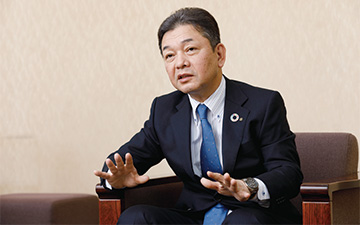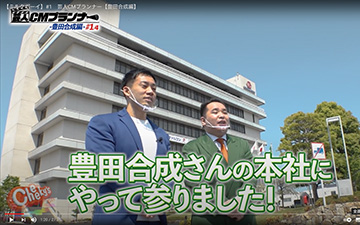Major environmental changes continue
2020 was a year when the novel coronavirus threatened the sense of security in people’s lives. I would like to express my deepest sympathy to all those who contracted the SARS-CoV-2 virus and everyone affected by the spread of infections. Toyoda Gosei continues to hope for a return to regular life as soon as possible, and we are doing our utmost to contribute to solutions to social issues through our business activities.
Toyoda Gosei had positioned 2020 as a year to display our true abilities and turn to full offense, but we were hugely affected by the novel coronavirus in the first half of the fiscal year. The entire Toyoda Gosei Group worked together to restore profits, reducing labor costs and expenditures among other measures. In the second half of the fiscal year, we were boosted by a recovery in automobile production volumes and achieved a significant increase in profits compared with the previous year.
Throughout this unprecedented year, I felt strongly that our business foundation has been strengthened by our rapid response to environmental changes and our cohesion as One Team.
One way in which we adapted quickly to environmental changes was to swiftly develop infrastructure and rethink systems to facilitate new working styles, incorporating telework and Web conferences in order to prevent the spread of COVID-19. At first, some employees said that the new working styles would weaken communication and the unaccustomed working environment would be a distraction. However, by sharing good examples of telework in various workplaces in the company and holding workshops on how to use the new communication tools, these systems gradually became accepted. We now feel that these systems can be used for the purpose of implementing more effective and efficient working styles.
The changes in working styles in response to these environmental changes are seen in both our Japanese and international locations. They are symbolized by the adoption of various modifications so that production preparations and production could be continued and deliveries to customers would not be interrupted. This was done even though production sites could not be visited in a timely manner due to voluntary restrictions on going out and travel restrictions in each country. Locations where production preparations were previously carried out with support by people sent from Japan were able to prepare smoothly with remote support, using Web conferencing systems and cameras, for the start of production. Times of emergency call for even closer communication between the head office and other locations, and we feel progress has been made in localization of production preparation. This year has also nurtured a sense of solidarity both within the Toyoda Gosei Group and with our customers and suppliers. We are sharing the status of our efforts with suppliers and providing timely support when they face difficulties. Our solidarity has increased thanks to active communication in a difficult situation.
There have also been cases in which rapid responses to environmental changes led directly to business and social contributions. With the development of our new elemental technology called e-Rubber and the commercialization of a heart surgery simulator, we have expanded our network in the medical field, including university hospitals. Thinking about what we could do to help fight the coronavirus, we went to talk to people at hospitals, which were under great strain. Finding out what they needed led to us providing protective gear that takes advantage of the features of the fabric in airbags, one of our major products, and PCR test vehicles. Next, our UV-C (deep UV) LEDs have been shown to inactivate the novel coronavirus. The commercialization of UV-C LEDs, which was already underway in our mediumterm plan, was brought forward with a focus on the three areas of air disinfection, water purification, and surface disinfection. These products are beneficial to the world, and we have been able to bring them out with exceptional speed.
Next, let me say a few words about “virtual business trips” as an example of my own efforts to deal with environmental changes. The COVID-19 situation and how we were dealing with production differed completely in each region of the world. I wanted to gain a solid understanding of the situation in each place and offer words of appreciation to our team members who were working so hard. However, I couldn’t visit them directly because of travel restrictions. When I asked myself what I could do, I decided I would try to visit all of our overseas plants remotely as a substitute for overseas trips. This allowed me to deepen my understanding of the circumstances in those locations by confirming them live, even though it was done remotely. In this way I was able to go around to all plants globally in a short time and actively communicate with people in each country. I see this as a benefit brought about by work-style reforms.
Key efforts in fiscal 2021

The automobile industry is said to be undergoing a “huge, once-a-century transformation,” in which the wave of CASE is surging across the industry. Achieving carbon neutrality has also come to be seen as a critical issue shared by the entire world.
Toyoda Gosei is doing its utmost to achieve the goals in its 2025 Business Plan for the medium-term, while also looking toward these huge changes in the business environment. We are accelerating new efforts while keeping in mind that each of us must adapt our own mindset and behavior.
Toyoda Gosei has three aims in working toward carbon neutrality. The first is to eliminate the risks from climate change. Increasing emissions of greenhouse gases and a rise in the average global temperature have resulted in abnormal weather, and the damage caused by this, such as the massive flooding seen in one country after the other, has become a familiar occurrence. We believe that companies have a social responsibility to try to achieve carbon neutrality. Second is to respond to the demand for carbon neutrality from our many stakeholders, including customers and investors. Fewer carbon emissions will lead to new values and bases for decisions, and will be essential to raising our corporate value. The third is that carbon neutrality is an opportunity for our company to grow sustainably. Toyoda Gosei is developing products and technologies that will contribute to decreased CO2 emissions. We are already developing high pressure hydrogen tanks for FCEVs, plastic fuel filler caps and other lighter weight products, and rubber recycling technology. We believe that it will now be important to visualize CO2 emissions in life cycle assessments while also making more concrete development plans for products and technologies to further reduce CO2 emissions. We have shared these three targets with management and all employees, and to achieve them we have established a carbon neutrality project and undertaken new challenges. At Toyoda Gosei we work with rubber and plastic, and will face many difficulties in achieving carbon neutrality through the lifecycle associated with all upstream to downstream aspects of our manufacturing. Our efforts to date have focused on reducing productionrelated CO2 emissions, but there is a need to implement wide-ranging responses in materials, design, distribution and more. We therefore decided to start a companywide, cross-functional project with the participation of many divisions. We want these efforts not to be undertaken by our company alone but through an active partnership with potential collaboration with our supply chain, including raw material manufacturers and suppliers, and manufacturers in the same industry. With application of the original technology we have developed so far and innovative manufacturing initiatives, we believe we can fulfill our social mission of carbon neutrality as a leading company in the field of rubber and plastics.
Responding to the changes in the business environment, we started the “Digital Transformation Department” to resolve management issues with a greater sense of speed. Over the past several years, we have increased the use of IT and IoT in business process improvements and automation of manufacturing lines, and achieved a certain level of results. With the new organization, we have brought together related divisions to accelerate reforms from the perspective of what is best for the company overall, and will build a global information base and conduct advanced analyses, make efforts to expand the use of AI, and provide support for the resolution of management issues with digital technology.
We have also started up an “Automotive Business Headquarters” to strengthen coordination in activities from receiving orders to production of new vehicle models, and build a system in which the entire business unit responds quickly to customer demands. By rapidly introducing systems based on environmental changes and properly sharing within the company the changes occurring in the business environment, we are each adapting our mindset and behavior to meet the challenges of the changing environment.
Accelerating efforts for SDGs/ESG

We believe we can contribute to a sustainable society and also achieve growth of the company by providing products that help to solve social issues. We are taking the initiative in efforts that contribute to solving the global issues shown in the United Nation’s Sustainable Development Goals (SDGs) and in the Environmental, Social, and Governance (ESG) field.
I feel that through the development of airbags and products such as the UV-C LEDs mentioned earlier, Toyoda Gosei products contribute to solving social issues. All employees will make efforts to contribute to achieving the 17 SDGs, while at the same time continuing efforts related to materiality issues that have been identified as issues of focus. For the entire company to move forward together as one, it is important that employees understand the SDGs and act on their own. In cooperation with entertainment company Yoshimoto Kogyo, which is also committed to the SDGs, we will expand into new endeavors including the production of PR videos.
To meet the expectations of our shareholders, we are making ESG efforts. For Environment, we have declared our intention to achieve carbon neutrality by 2050 and are not only accelerating activities to reduce CO2 emissions but have also set milestones related to waste and water for the medium and long terms. As “Environmental TG,” we are making a broad range of efforts. In the area of Society, we have introduced engagement surveys to raise job satisfaction, based on the belief that it is important to raise the activity and unity that form the foundation for the growth of our company. We are also striving to raise the abilities of the Group overall, such as strengthening training for next-generation leaders, DX personnel, and others who will support our future growth.
We are going to start executive meetings called “Sustainability Meetings” to discuss issues related to sustainability, such as the environment and society, and further accelerate our SDGs/ESG efforts.
To our stakeholders
I joined Toyoda Gosei 40 years ago. When I think back on the history of the company, I see that we have built many core competencies, from the development of rubber and plastic parts to the development of blue LEDs, the development of airbags, and various other undertakings. LEDs in particular, with their low energy consumption and long life, are one of the technical innovations that could be said to be leading the way to carbon neutrality. Airbag development has also spread to countries around the world today as means to help decrease the number of traffic fatalities, an issue associated with automobiles. The knowledge and know-how we have cultivated through development and production, as well as our supply chain and global network, are all major strengths of Toyoda Gosei. We believe that we can continue to contribute to a sustainable society into the future.
Our target year for carbon neutrality has been set at 2050. The year before that, 2049, will be the year Toyoda Gosei celebrates its 100th anniversary. Our predecessors took on challenges again and again to make us a company that grows sustainably and brings positive change to the world, and we build on that inheritance as we climb steadily toward the year 2050.
